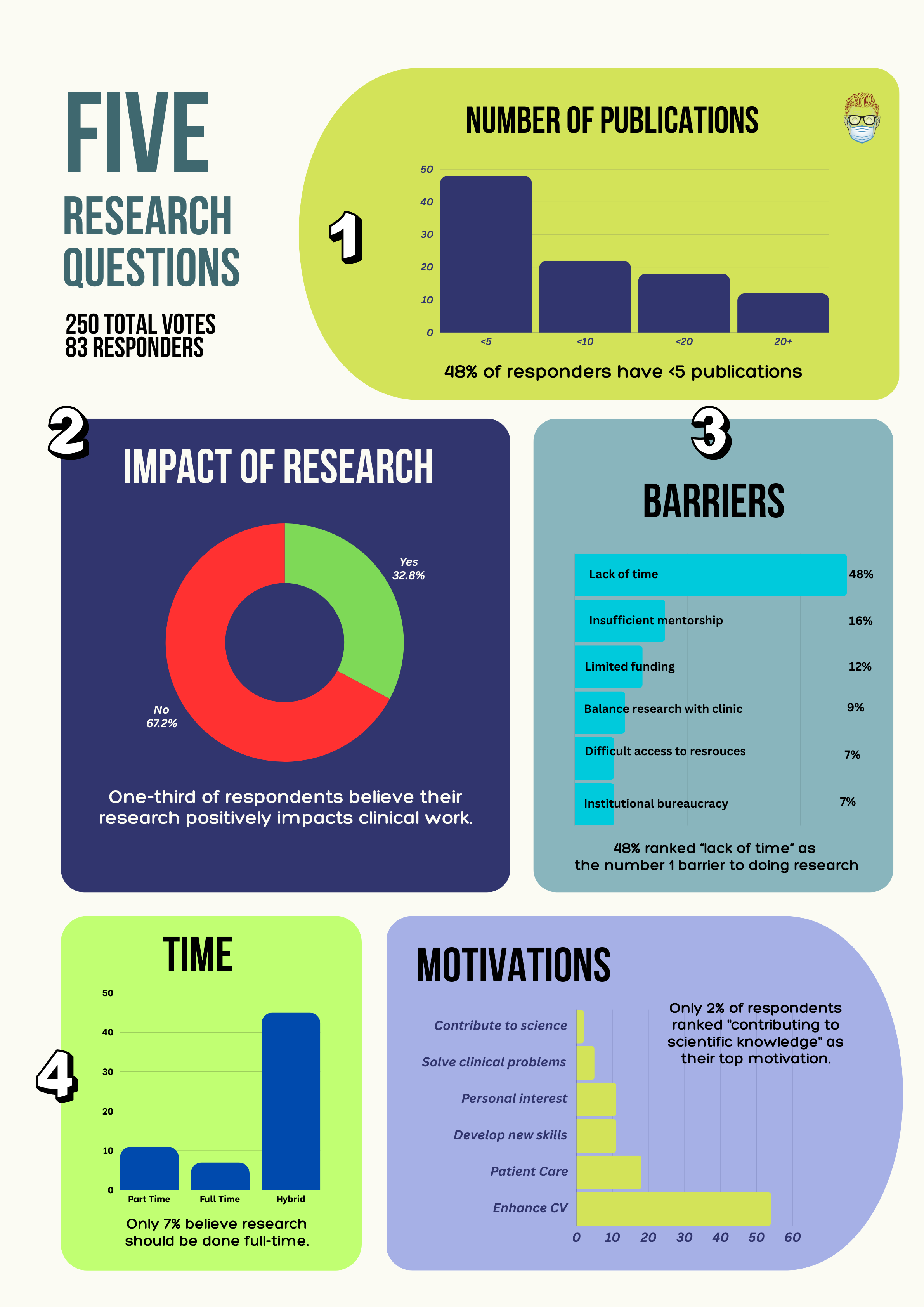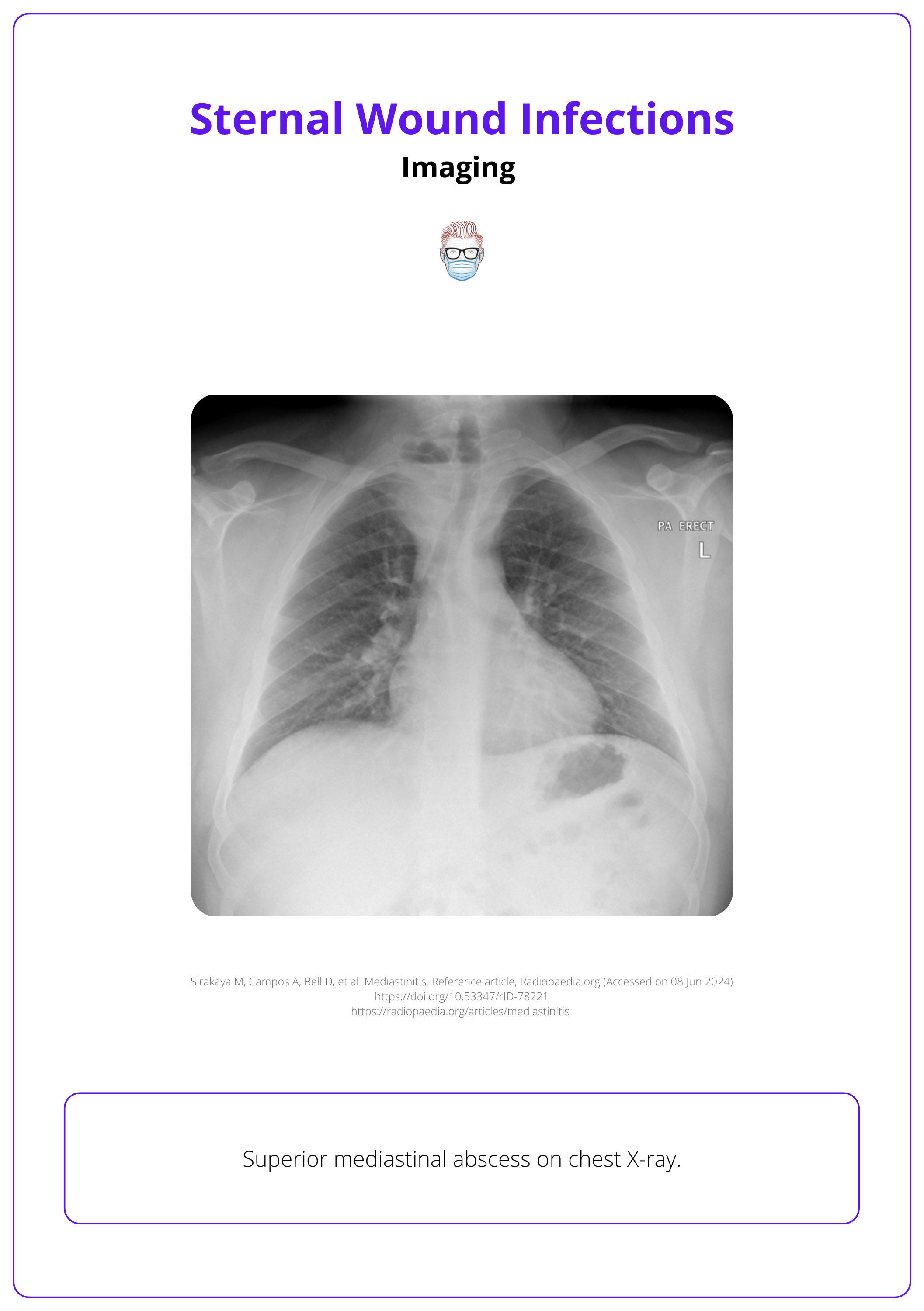In this week's edition
- ✍️ Letter from P'Fella
Is enhancing your CV the #1 research priority? - 🤓 The Sunday Quiz + Leaderboard
Check out the winners on our leaderboard! - 🎙️ Behind the 'Fella
Episode 03 is out now! - 🎓 theFellows' Corner
New in: Sternal wound infections diagnosis & treatment. - 📖 What Does the Evidence Say?
Treatment of a congested free flap. - 🔥 Recommended Articles of the Week
Microsurgical breast reconstruction, free flaps reconstruction for soft tissue defects, & immediate lymphatic reconstruction; with 1 sentence summaries. - 💕 Feedback
Suggest ideas & give feedback!
A Letter from P'Fella
Enhancing Your CV is Your #1 Research Priority (Apparently)
Ever wondered why we really do research? I recently conducted a survey of 80 people in the plastics field about their research motivations and challenges, and the results were quite eye-opening.
Here are the highlights 👇
I recently conducted a survey with over 240 votes in the plastics field, asking about your research motivations and challenges. The results were quite eye-opening.
- Nearly half of you have fewer than five publications, while just over 10% have more than 20.
- Only one in three believe their research has a significant clinical impact.
- Half of you feel there isn’t enough time to conduct research in your current roles.
- The top motivation for research is enhancing your CV, while contributing to science ranked the lowest.

It seems research has turned into a currency, adding career value regardless of its scientific impact. This focus on quantity over quality is understandable but somewhat disheartening.
The incentive structure clearly favors volume, especially early in one’s career, often at the expense of quality. In the most recent episode of Behind the 'Fella, we talk about the importance of collaborative research, leading to better results. Despite these changes, academia still largely values the sheer number of publications.
Our system pushes us toward producing high volumes of publications, often overshadowing quality. Case reports and series, while clinically valuable, are not always considered rigorous research. This distinction needs to change in how we evaluate and reward research efforts.
Love,
P'Fella
tl;dr
👉 +240 votes from plastics professionals reveals research motivations.
👉 1 in 3 believe their research impacts clinical practice.
👉 50% feel they lack time for research in their current roles.
👉 Top motivation: enhancing CV
👉 Lowest motivation: contributing to science.
👉 Research is often valued for quantity over quality.
The Sunday Quiz
*Drumroll🥁* We've Got New Winners!
We're thrilled to announce the winners of this edition's quiz. After six rounds of questions on plastic surgery, our top scorers are AL, Maitumelo, and Shehzadi.
With a tie at the top, we're planning on a live playoff on our podcast! We'll contact the finalists soon.
Thank you to everyone who participated and stay tuned for more fun quizzes in future editions!

Here's the rest of the leaderboard.
Behind the ‘Fella
Episode 03 Release
In this week's episode, we explore plastic surgery research with our guest, Justin Wormald!
Check out the latest episode on Spotify & Apple.
the Fellows' Corner
This Week's Focus: Sternal Wound Infections

Sternal Wound Infections
Definition
Sternal wound infections are divided into superficial (skin subcutaneous tissue and fascia) and deep (extending down to sternal bone hardware and mediastinum).
Classification
SWIs are often classified according to timing from surgery; for example, the Palierolero classification.
Risk Factors
Risk factors can be grouped into patient-related (e.g., diabetes and obesity), intraoperative (e.g., increased surgical time), and postoperative factors (e.g., prolonged ICU stay).
Diagnosis
Diagnosis is clinical and can be supported by laboratory tests such as FBC, ESR, CRP, and blood culture and imaging such as CXR and CT.
Treatment
Superficial infections can be treated with antibiotics and local wound care while DSWI requires debridement, hardware removal, and early closure including flap closure.
Flap Reconstruction
Pectoralis major, rectus abdominis, latissimus dorsi, and omental flaps are the main flaps used for soft tissue cover in SWIs.
Complications
Complications with sternal wound infections include recurrent wound infections and wound dehiscence flap donor site morbidity (e.g., hernia) post rectus abdominis harvest.
What Does the Evidence Say?
Treatment of a Congested Free Flap
Venous congestion is a significant complication in free flap surgery. Various techniques have been proposed to manage this issue. Local subcutaneous injection of low molecular-weight heparin has shown effectiveness in salvaging congested flaps (Pérez et al., 2014). Medical leeches have also been successfully used to treat venous insufficiency (Soucacos et al., 1994; Pannucci et al., 2014). Vacuum-assisted closure therapy has been reported as a novel approach to alleviating venous congestion (Uygur et al., 2008).
Venous catheterization can increase venous outflow (Gürsoy et al., 2008). The superficial inferior epigastric vein is commonly used to augment venous drainage when congestion occurs (Kim et al., 2015; Niranjan et al., 2001; Rohde & Keller, 2005). Preserving the opposite pedicle or superficial veins during flap harvest provides options for venous augmentation if needed postoperatively (Niranjan et al., 2001).
Articles of the Week
3 Interesting Articles with 1 Sentence Summaries
Explore the evolution of techniques, preoperative planning, surgical steps, and enhanced recovery pathways to achieve optimal patient outcomes in microsurgical breast reconstruction with abdominally-based flaps.
A meta-analysis on the reliability and safety of free flaps, the procedure's evolution, complication rates, and the efficacy of various techniques over the last two decades.
Discover evolving techniques, advanced imaging, strategic planning, and how these innovations have shaped safe and effective surgical approaches in reducing breast cancer-related lymphedema.


